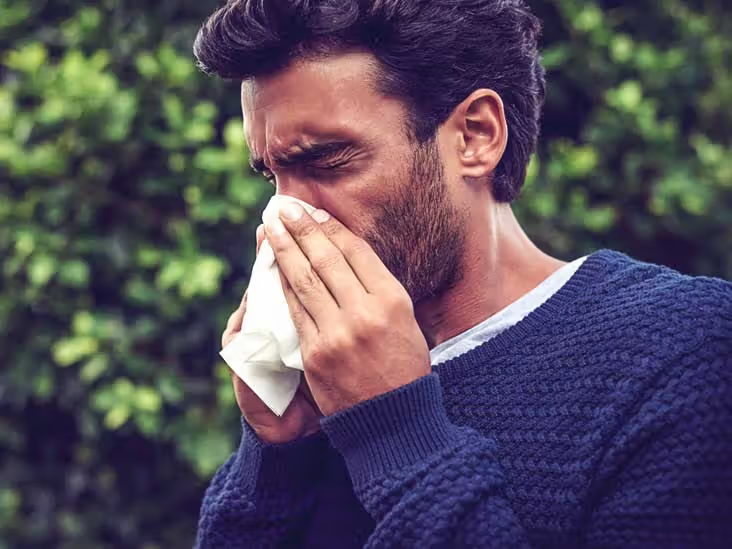An allergy occurs when the immune system overreacts to a normally harmless substance, known as an allergen. The body’s defense mechanism mistakenly identifies these substances as threats, triggering a response that can lead to various symptoms. The severity and type of reaction depend on the allergen and the individual’s immune sensitivity.
The Immune System’s Role in Allergic Reactions
The immune system protects the body by producing antibodies to combat harmful invaders like bacteria and viruses. One such antibody, immunoglobulin E (IgE), plays a key role in allergic responses. When IgE detects an allergen, it signals the release of chemicals such as histamine, leading to inflammation and other allergy symptoms.
Allergic reactions can range from mild discomfort to severe, life-threatening conditions. According to the Centers for Disease Control and Prevention (CDC), approximately 30% of Americans experience some form of allergy.
This guide explores the different types of allergies, their symptoms, causes, and available treatments.
When to Seek Emergency Care
Some allergic reactions can escalate into anaphylaxis, a severe and potentially fatal condition. Immediate medical attention is required if any of the following symptoms occur:
- Swelling of the face, throat, or tongue
- Dizziness, confusion, or loss of consciousness
- Difficulty breathing, swallowing, or speaking
- Persistent coughing or wheezing
- Bluish or pale skin discoloration
If an epinephrine auto-injector (EpiPen, Auvi-Q, etc.) is available, administer it immediately while waiting for emergency assistance.
Types of Allergies
Allergies can be categorized into several types, including:
- Food allergies (e.g., peanuts, shellfish, dairy)
- Seasonal allergies (hay fever or allergic rhinitis)
- Asthma (often triggered by allergens)
- Atopic dermatitis (eczema)
- Skin allergies (contact dermatitis)
- Drug allergies (e.g., penicillin)
- Insect sting allergies (e.g., bee venom)
Each type has distinct triggers and symptoms.
Common Allergy Symptoms
Symptoms vary depending on the allergen and individual sensitivity. The American College of Allergy, Asthma, and Immunology (ACAAI) lists the following common signs:
- Nasal congestion or runny nose
- Sneezing and coughing
- Fatigue and headaches
- Skin rashes (hives, eczema)
- Nausea or vomiting
- Fever (in rare cases)
- Wheezing or shortness of breath
Skin-Related Allergy Symptoms
Direct contact with allergens can cause:
- Itchy, red, or swollen skin
- Hives or raised welts
- Burning or tingling sensations
- Watery or puffy eyes
What Causes Allergies?
The exact reason why some people develop allergies remains unclear, but several factors contribute:
- Genetics (family history of allergies)
- Environmental exposures (pollution, pollen, dust mites)
- Diet and gut health (microbiome imbalances)
- Age and immune system changes
- Hormonal fluctuations
Allergens enter the body through:
- Ingestion (foods, medications)
- Inhalation (pollen, pet dander, mold)
- Skin contact (latex, metals, insect stings)
Diagnosing Allergies
A healthcare provider will review symptoms and medical history before conducting tests such as:
- Blood tests (measuring IgE levels)
- Skin prick tests (exposing skin to small allergen amounts)
These help identify specific triggers.
Treatment Options
1. Medications
Common allergy medications include:
- Antihistamines (Benadryl, Zyrtec, Claritin)
- Corticosteroids (nasal sprays, creams)
- Decongestants (Sudafed, Afrin)
- Mast cell stabilizers (preventing histamine release)
2. Immunotherapy
Long-term solutions include:
- Allergy shots (gradual exposure to allergens)
- Sublingual immunotherapy (SLIT) (under-the-tongue tablets)
3. Emergency Epinephrine
For severe allergies, carrying an auto-injector (EpiPen, Jext, etc.) is crucial.
4. Natural Remedies
Some people find relief through:
- Saline nasal rinses
- Air purifiers and humidifiers
- Dietary adjustments
- Essential oils (with caution)
Note: Always consult a doctor before trying alternative treatments.
Preventing Allergic Reactions
While allergies cannot always be prevented, symptoms can be minimized by:
- Avoiding known allergens
- Reading food labels carefully
- Using hypoallergenic bedding
- Keeping indoor air clean
- Following prescribed treatment plans
Potential Complications
The most dangerous complication is anaphylaxis, which can be fatal without prompt treatment. Allergies may also worsen conditions like asthma or eczema.
Allergies vs. Other Conditions
Allergies vs. Colds
- Allergies: Itchy eyes, long-lasting symptoms, no fever
- Colds: Body aches, fever, resolves in 1-2 weeks
Allergies vs. Asthma
- Allergies trigger asthma in some individuals, leading to allergic asthma.
Allergies vs. Bronchitis
- Bronchitis is often caused by infections, but allergens can worsen symptoms.
Allergies in Children
About 25% of U.S. children have allergies, with the most common being:
- Hay fever
- Skin reactions (eczema)
- Food allergies (peanuts, milk, eggs)
Parents should watch for frequent sneezing, rashes, or digestive issues.
Frequently Asked Questions
What are common allergy symptoms?
Sneezing, congestion, rashes, nausea, and breathing difficulties.
What are the top food allergens?
Milk, eggs, peanuts, tree nuts, soy, wheat, fish, shellfish, and sesame.
How can allergies be managed?
Avoidance, medications, immunotherapy, and emergency epinephrine.
Final Thoughts
While most allergies are manageable, severe reactions require immediate care. Working with a healthcare provider ensures proper diagnosis and treatment, improving quality of life.
